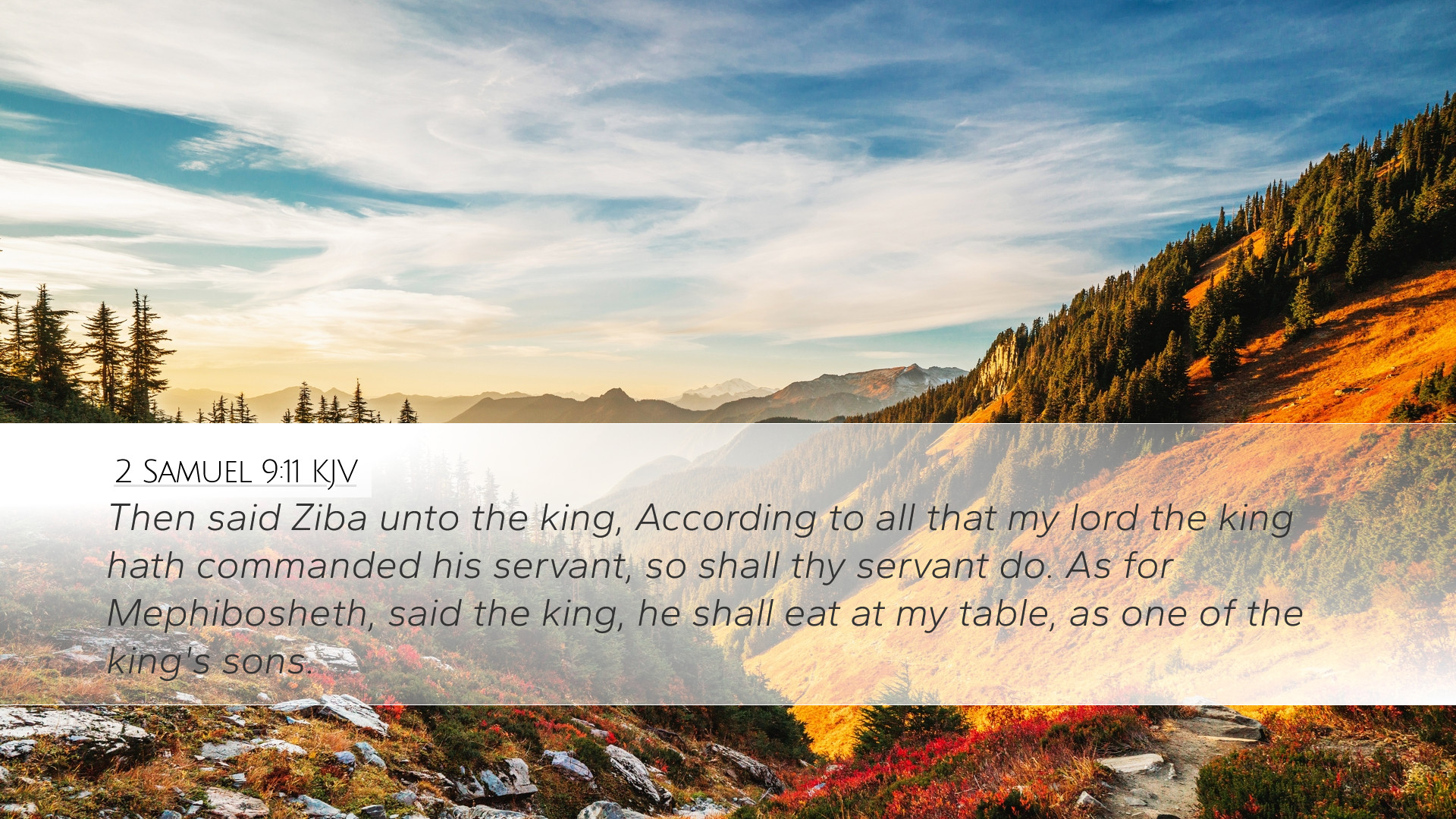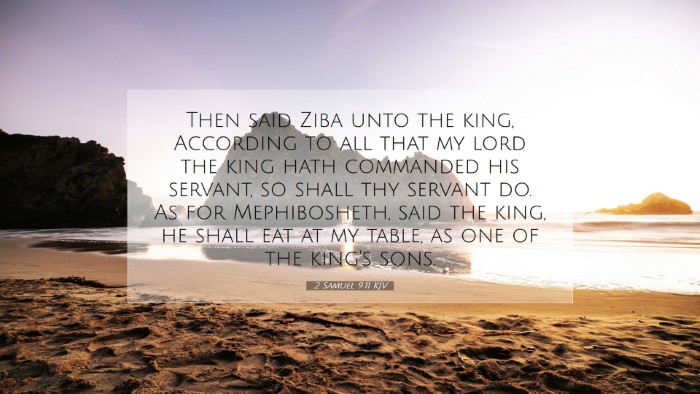Old Testament
Genesis Exodus Leviticus Numbers Deuteronomy Joshua Judges Ruth 1 Samuel 2 Samuel 1 Kings 2 Kings 1 Chronicles 2 Chronicles Ezra Nehemiah Esther Job Psalms Proverbs Ecclesiastes Song of Solomon Isaiah Jeremiah Lamentations Ezekiel Daniel Hosea Joel Amos Obadiah Jonah Micah Nahum Habakkuk Zephaniah Haggai Zechariah Malachi2 Samuel 9:11
2 Samuel 9:11 KJV
Then said Ziba unto the king, According to all that my lord the king hath commanded his servant, so shall thy servant do. As for Mephibosheth, said the king, he shall eat at my table, as one of the king's sons.
2 Samuel 9:11 Bible Commentary
2 Samuel 9:11 Commentary Summary
Verse: "And Ziba said unto the king, According to all that my lord the king hath commanded his servant, so shall thy servant do. As for Mephibosheth, said the king, he shall eat at my table, as one of the king's sons."
Context and Background
This verse occurs in a narrative where King David seeks to show kindness to any remaining members of Saul’s family, particularly for the sake of his friend Jonathan. Mephibosheth is introduced as Jonathan’s son, who has been crippled, embodying the remnants of royal bitterness and personal tragedy.
Insights from Public Domain Commentaries
Matthew Henry's Commentary
Henry highlights that David’s desire to show kindness is rooted in covenant loyalty. The spirit of kindness towards Jonathan's son underscores the graces of mercy and grace that should characterize followers of God.
- David’s Inquiry: His inquiry about remaining heirs was not merely a gesture of goodwill but reflects a completion of his covenant obligations.
- Ziba’s Testimony: Ziba, a servant to Saul’s house, articulates obedience and readiness to fulfill David’s commands. His response emphasizes the respect and duty owed to the anointed king.
- Mephibosheth's Inclusion: The promise that Mephibosheth will eat at David’s table indicates restoration to dignity and the blessing of royal favor.
Albert Barnes' Notes on the Bible
Barnes comments on the significance of hospitality and community in ancient monarchies. Eating at the king's table symbolizes inclusion and acceptance, indicating that David does not merely acknowledge Mephibosheth; he actively elevates him.
- Theological Implication: This act illustrates the broader theological themes of God’s unmerited grace. Just as David extends kindness, so does God extend grace to those who are spiritually impoverished.
- Position of Honor: Mephibosheth’s place at the table is one of honor, reminding readers of the Christian belief in being co-heirs with Christ.
Adam Clarke’s Commentary
Clarke’s observations draw attention to Ziba's role as a conveyer of David's commands while also noting the deeper meaning behind David’s actions towards Mephibosheth.
- Symbolism of Kingship: The act of accepting Mephibosheth reflects the reconciliation theme often echoed in scripture. It signifies the breaking down of barriers caused by past enmities.
- Moral Lessons: Clarke urges readers to see how David’s kindness challenges worldly notions of power and authority, illustrating the attributes of humility and tender mercy.
Theological Reflections
The discussion surrounding this verse naturally leads to theological themes such as grace, restoration, and covenant faithfulness. As pastors and theologians reflect on David’s actions, they are reminded of Jesus' persistence in reaching out to the marginalized.
Grace Illustrated
David’s kindness to Mephibosheth can be seen as a prefigurative act of the grace offered by Christ to believers. Just as Mephibosheth had nothing to offer David, human beings have nothing that can earn their salvation.
Covenant Relationship
The restoration of Mephibosheth to a position of honor metaphorically illustrates the believer's relationship with God established through the new covenant. Believers are seated at the table of grace, symbolizing acceptance and value in the eyes of God.
Conclusion
In summary, 2 Samuel 9:11 offers rich insights into the nature of divine mercy and the relational dynamics between God, the King, and those who are considered the least. It fosters a deeper understanding of the gravity of covenant relationships and encourages a posture of kindness in pastoral ministry and personal interactions.


